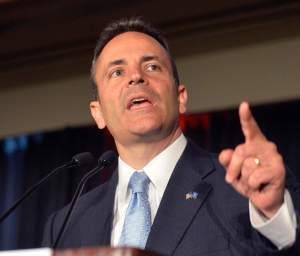Reprinted from Kentucky.com: http://www.kentucky.com/news/local/article53335615.html

Rebecca Collett was addicted to drugs and spent nearly two years in prison, but after she got clean, she says she could not find a job, a place to live or even get accepted into college.
Her felony conviction scared away opportunities because of the legal liabilities associated with hiring or admitting felons. Collet is one of about 94,000 Kentuckians with felony convictions, according to Kentucky Chamber of Commerce President Dave Adkisson, and business leaders see them as part of the solution to solving the state’s workforce shortage.
But first, they say, Kentucky lawmakers have to make it possible for Collett and others like her to expunge their records. Previous efforts to do this have failed, usually dying in the Republican-controlled state Senate because lawmakers could not agree on how long a person should have to wait before having their record wiped clean.
Wednesday, new Republican Gov. Matt Bevin “challenged” the state Senate to pass the law, calling it “the right thing to do.”
“I would challenge our senators to remember there is no time when an individual is more vulnerable, no period when there is greater likelihood of recidivism than during that immediate window after which a person has served their (prison) term,” Bevin said.
The proposed legislation would let people convicted of Class D felonies — nonviolent crimes whose maximum sentence is five years in prison — ask the court to clear their records. It would not apply to anyone who has multiple felony convictions or has committed a sex crime or a crime against a child or an elderly person. Offenders would have to wait five years after they finish their prison sentences before they could apply for an expungement.
Senate Republicans unveiled their priority bills Wednesday. The list did not include expungement. But Senate Majority Floor Leader Damon Thayer said that does not mean the Senate is not supportive.
“There is a general bipartisan feeling that we ought to do something on expungement,” said Thayer, who referred to himself as a Catholic Christian who believes in redemption. “I’m not going to commit to being for an expungement bill until I get a chance to read it.”
The Kentucky Constitution also bans convicted felons from voting, unless they have received a pardon. Democratic State Rep. Daryl Owens of Louisville, the bill’s primary sponsor, says the expungement bill would also restore a person’s right to vote. But Bevin and other Republican leaders dispute that, saying they are separate issues.
Former Democratic Gov. Steve Beshear automatically restored the voting rights of some nonviolent convicted felons via executive order before he left office. Bevin, however, called that order “illegal” and suspended it. He says it is up to the state legislature to determine that, not the governor.
“I want to ensure that when something in the case of expungement passes that it has teeth, that is has a root, that it is meaningful, that it is not easily reversed other than by the will of the people,” Bevin said.
After years of struggle, Collett said she was finally able to get into college and an apartment at the Family Scholar House, a Louisville nonprofit. She said she will soon graduate with a master’s degree in social work from the University of Louisville.
“I know I deserve a second chance,” she said.